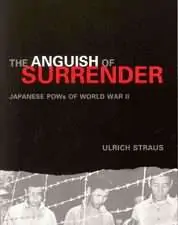Back to Diplomats and Diplomacy
The Anguish of Surrender: Japanese POWs of WWII
 “The Anguish of Surrender is a marvelous book, describing in great and often moving detail the experiences of Japanese prisoners of war in allied (mostly U.S.) hands. Such a perspective adds significantly to our understanding of the rather remarkable history of U.S.-Japanese reconciliation after a bitter war.” – AKIRA IRIYE, Harvard University
“The Anguish of Surrender is a marvelous book, describing in great and often moving detail the experiences of Japanese prisoners of war in allied (mostly U.S.) hands. Such a perspective adds significantly to our understanding of the rather remarkable history of U.S.-Japanese reconciliation after a bitter war.” – AKIRA IRIYE, Harvard University
In The Anguish of Surrender, Ulrich Straus recounts the painful dilemma that intensely indoctrinated Japanese soldiers and sailors faced when forced to confront the reality of becoming captives, something forbidden by Japan’s no-surrender policy. He examines in depth how Japanese POWs dealt with this dilemma in extremis – between life and death – leading many to drop their illusions and reveal themselves.
Straus shows how trained Allied linguists, especially Japanese Americans, extracted useful intelligence from their psychologically unprepared captives by affording them humane treatment. For his research, Straus interviewed and corresponded with former POWs in Japan and delved deeply into POW interrogation records at the National Archives, interviews with America’s Japanese language officers and enlisted men, Japanese source material – including publicly and privately published books and articles by former Japanese POWs – and later writings by their U.S. Army and Navy interrogators.
Combining scholarship, expertise, and empathy, Straus conveys, for the first time in English, the truly dramatic and deeply human stories of Japanese POWs, from their prewar indoctrination through unexpected prison camp experiences to postwar reintegration. In the process he advances our understanding of the paradoxical wartime roots of postwar Japanese-American friendship.
ULRICH “RICK” STRAUS lived in Japan a total of twenty-one years, beginning in 1933–1940 while still a child. He returned there as a U.S. Army Japanese language officer in early 1946, serving in the Occupation, at the Tokyo major war crimes trial, and in the Intelligence Division (G-2) at GHQ, to which he returned during the Korean War. In 1957, he joined the State Department. Fully half his thirty-year Foreign Service career dealt directly with Japan – ten years in Japan, in the political section of Embassy Tokyo and as consul general in Okinawa, and five at the State Department working on U.S.-Japan relations. He also served in West Berlin, as political counselor in Bern, as director of Philippine affairs, and as adjunct professor at the National War College. Since retiring from the Senior Foreign Service in 1986, he has written on Japan and U.S.-Japan relations and taught and lectured at various universities and colleges. He appears as a regular local PBS foreign affairs commentator in Michigan.
